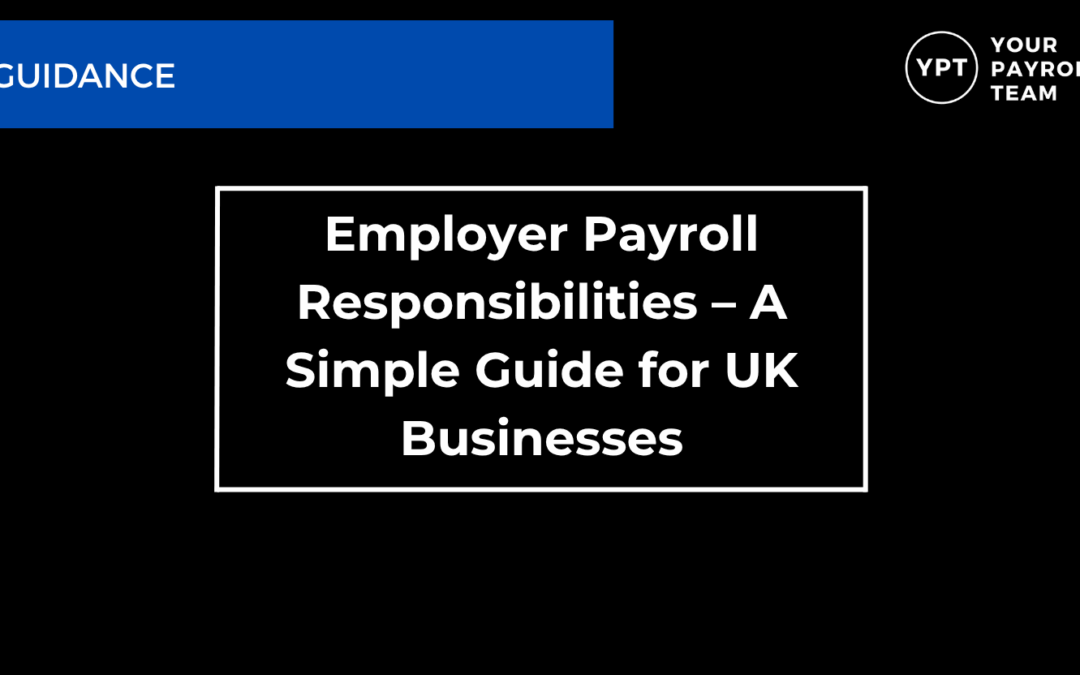As an employer, you’re legally responsible for paying your staff correctly and meeting your payroll obligations.
If you’re unsure what those responsibilities are — or whether you’re meeting them — this guide explains the essentials in plain English.
Your Payroll Team can support you with any of these areas if you need help.
At a Glance
Employers must ensure:
-
Accurate payroll calculations
-
Correct tax and National Insurance deductions
-
Statutory payments are paid correctly
-
RTI submissions are sent to HMRC on time
-
Pensions and auto enrolment rules are followed
-
Holiday pay and NMW rules are applied correctly
-
Payroll records are kept for at least three years
Your Main Payroll Responsibilities Explained
Payroll is more than entering hours and pressing a button. Here’s what UK employers must do to stay compliant:
1. Pay Employees Correctly and On Time
This includes:
-
Contractual pay
-
Overtime and variable pay
-
Bonuses or commission
-
Sick pay, maternity/paternity pay, and other statutory payments
Late or incorrect pay is one of the quickest ways to damage trust.
2. Deduct the Right Tax and National Insurance
You must:
-
Use the correct tax codes
-
Apply NI categories properly
-
Process deductions for student loans, AEOs and salary sacrifice schemes
-
Ensure all changes are applied correctly through payroll
Incorrect deductions can lead to costly corrections later.
3. Meet Your HMRC Reporting Obligations
Employers must send:
-
FPS (Full Payment Submission) every payroll run
-
EPS (Employer Payment Summary) where applicable
-
P11D(b) if benefits are provided
-
Year-end submissions
Failing to submit on time can lead to penalties.
4. Manage Employee Benefits Correctly
You must apply rules consistently for:
-
Payrolling benefits
-
Employer-provided benefits
-
Salary sacrifice schemes
-
Benefits in kind that affect tax and NI
From 2027, most taxable benefits will need to be payrolled — another responsibility to prepare for.
5. Follow Pensions and Auto Enrolment Rules
This includes:
-
Assessing workers correctly
-
Enrolling eligible employees
-
Paying employer contributions
-
Submitting pension files
-
Re-enrolment every three years
Non-compliance can result in penalties from The Pensions Regulator.
6. Apply Holiday Pay Laws Correctly
This means:
-
Using correct calculations for irregular hours and part-year workers
-
Including “normal remuneration” where required
-
Tracking entitlements accurately
-
Following the 2024/25 legislative changes
Holiday pay errors are one of the most common employer risks.
7. Comply with National Minimum Wage (NMW)
Employers must:
-
Ensure pay meets NMW rates after all deductions
-
Track hours correctly
-
Apply rules for salaried hours workers, apprentices and variable workers
-
Avoid unintended underpayments
Most breaches are accidental — but the penalties are real.
8. Keep Payroll Records
Employers must keep accurate payroll records for at least three years, including:
-
Hours worked
-
Amounts paid
-
Deductions
-
Tax submissions
-
Pension contributions
-
Holiday taken and entitlements
Good records make compliance far easier.
Why Employers Work with Us
We help employers who:
-
Aren’t fully confident their payroll is compliant
-
Have had errors, complaints or HMRC queries
-
Want expert guidance without hiring an in-house payroll specialist
-
Need help with holiday pay, NMW or payrolling benefits
-
Want to hand payroll over to specialists so they can focus on running their business
You stay the employer — we help you meet your responsibilities.
How We Can Support You
We offer:
-
Outsourced payroll services
-
Payroll compliance consultancy
-
NMW and holiday pay reviews
-
Payrolling benefits support
-
Payroll audits and health checks
-
Training for HR, finance and payroll teams
Whether you need day-to-day payroll or one-off advice, we’re here to help.
Pricing
Pricing depends on the level of support you need.
We’ll provide a clear, fixed proposal once we understand your requirements.
FAQ: Employer Payroll Responsibilities
Are employers legally responsible even if payroll is outsourced?
Yes. You remain responsible as the employer — but outsourcing to specialists significantly reduces the risk.
What happens if payroll errors are found?
We’ll help you understand the issue, correct any errors and prevent them happening again.
Do you provide one-off advice or only ongoing support?
Both. We can help with a single issue or become your long-term payroll partner.
Do you work with small businesses?
Absolutely — many small employers rely on us for compliance and accuracy.

